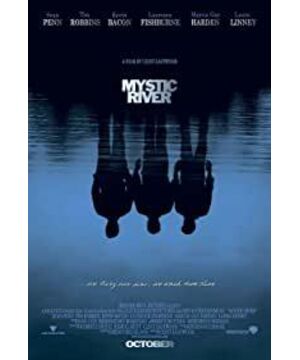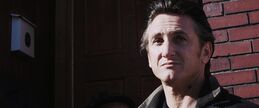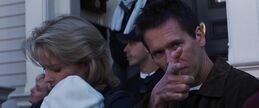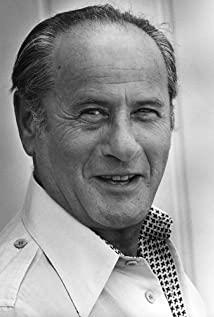Clint Eastwood is an all-round filmmaker, whose masterpieces include "Unforgivable", "Million Dollar Baby" and "Letter from Iwo Jima". He has won the Lifetime Achievement Award at internationally renowned film festivals for many times. The films he directed are generally tragic in narrative, and his in-depth exploration of human nature makes his films unusually profound.
Today we are going to talk about "Mystic River" directed by Eastwood, a film closely related to the fate of life.
The film "Mystic River" tells the story of three childhood friends who went to three different life trajectories due to different growth experiences. Jimmy's daughter is killed, and signs point to his childhood friend Dave. In order to avenge his daughter, Jimmy brutally killed Dave and threw his body into the Mystic River. The next day police officer Sean told Jimmy that the killer had been caught, but it was too late.
In the movie poster of "Mystic River", the three protagonists stand side by side by the river, and the river reflects the reflections of the three, alluding to the mapping of three different fates. The river water symbolizes the passage of time. No matter what kind of fate, it will eventually disappear in the mysterious river, reflecting a sense of powerlessness in controlling fate. Perhaps this is the origin of the film's name.
1. The double use of repetition and symbolism makes the plot of the film more complete and subtle
The film "Mystic River" has used repetitive and symbolic editing techniques for many times, and it appears repeatedly at key moments in the film, forming an effect of emphasizing and echoing before and after, making the film's plot more complete and subtle.
The names of the three friends on the concrete surface repeatedly appeared, highlighting the tragic fate of Dave; the car that disappeared from the camera symbolized the beginning of Dave's bad luck; Dave's inner demon was the shadow of his lingering childhood, An indirect killer of Dave's self-destruction.
- A concrete floor with the names of three friends written on it
1. Dave was taken away by a perverted car when he was young. The camera turned to the names on the wet concrete floor. The names of Jimmy and Sean were complete, and only half of Dave's name was written, indicating that Dave was doomed to an unfinished tragic fate. .
2. When Dave grew up, he took his son to pass by the concrete floor where three childhood friends wrote the names. The camera gave a close-up of the concrete floor, implying Dave's next misfortune.
3. The cement floor appears again at the end of the film. Dave's unfinished life is like a name on the cement floor, which echoes the beginning and end of the film, emphasizing the tragic fate of Dave.
- car away from camera
1. Jimmy and Sean watched Dave go away in a pedophile car. Dave was lying on the rear window and reluctantly looked at the two friends, implying that the childhood Dave was gone forever.
2. Dave was tricked into drinking by Sean's younger brother. The car went from near to far. Dave looked back at home, just like the scene when he was taken away by two perverts when he was a child, implying Dave's next misfortune.
3. Dave was killed by Jimmy, Sean asked Jimmy when was the last time he saw Dave, Jimmy said it was in the car that left us 25 years ago, implying that the relationship between the three friends fell apart, People have already moved to different life trajectories.
- Dave's Inner Demon
1. After being sexually assaulted by a perverted house arrest for four days as a child, Dave managed to escape. Dave drew the curtains upstairs and the two pals waved downstairs, saying goodbye to their childhoods.
2. While telling his son a bedtime story, Dave's mind flashed back to his childhood escaping from a pervert, and fear surrounded him. The appearance of the demon this time is a matter of fear and repentance. He does not want his son to repeat his mistakes.
3. Dave came out of the bar and happened to meet a child prostitute and a client. The anger in his heart made Dave kill the client. During the murder, the scene of running away in childhood appeared again, indicating that the gentle and kind-hearted Dave never got out of the shadow of childhood. shrouded.
2. Three types of people condensed from reality, whose character determines their destiny
At the beginning of the film, the different characters of the three partners can be seen from their childhood outfits. Sean wears a regular sweater, Jimmy wears a leather jacket and graffiti jeans, and Dave wears a hat and is very ordinary.
Sean represents people who follow the rules, Sean becomes an interstate cop as an adult; Jimmy, on the other hand, represents a class of people who ignore the rules, Jimmy as an adult has committed crimes, been in jail, has his own The way of doing things, not playing cards according to the routine; Dave represents a type of person who is weak in character and easy to be bullied in society, but when extremes turn against him, the childhood trauma that he cannot get out of makes him out of control and eventually leads to self-destruction.
1. Jimmy: Rebellious, unyielding, ignoring rules, likes to get his own way
When Dave blamed himself for accidentally hitting the ball in the sewer, Jimmy said, "You know what, Dave, it's supposed to be there." To differentiate himself, Jimmy brought Sean and Day The husband wrote his name on the wet concrete floor. When a pedophile pervert posing as an undercover cop called Jimmy over, Jimmy walked over with a bat in his hand.
The above behavior reflects Jimmy's rebellious character. He knows how to resist in the face of bullying, so he will not be easily bullied, and Jimmy has not cared about other people's eyes since he was a child.
After growing up, Jimmy still ignores the rules and likes to act in his own way. For example, when he learned that his daughter was killed, Jimmy did not trust the police. He chose to find out the murderer in his own way:
- He asked his friend to find bolt cutters so he could cut the barbed wire fence and enter the crime scene.
- Let the brother secretly investigate the cause of his daughter's death for him.
- When the Dais told Jimmy that Dave killed Katie, Jimmy chose to kill Dave himself and avenge his daughter.
Jimmy's distrust of the police reflects the poor social security situation in the United States at a certain period:
After the 1960s, the social security situation in the United States continued to deteriorate, and the urban crime rate continued to increase. By the end of the 1980s, the crime rate in the United States reached an all-time high.
Dave was imprisoned and sexually assaulted by a pedophile pervert at a time when crime rates in the United States were on the rise. Growing up in such an environment gave Jimmy a self-guided approach to doing things. Decades have passed, and the police are getting better and better, but people like Jimmy are still skeptical of the police's ability to do things.
However, it was characters like Jimmy that kept him from being taken away by pedophile criminals when he was a child, but Jimmy took the lead in writing on the green concrete floor for his rebellious behavior, but he led his little friend Dave. A tragic fate has come.
2. Dave: weak personality, naive, easy to trust others
Dave, a tall man with a weak voice, bowed his head and hunched his body, staggered when he walked, and his whole person revealed despair.
Twenty-five years ago, Jimmy, Dave and Sean were still 10-year-old boys. Jimmy took the lead in writing names on the wet concrete floor. The pervert posing as a plainclothes police chose Dave the soft persimmon, pushed him into the car, and pulled him from there. Opened the curtain of the tragedy of the whole film.
The Dais tell Jimmy that Dave killed Katie. Jimmy asked his friends to trick Dave into the bar. Jimmy repeatedly lobbied Dave to lie that Dave would let him go as long as he confessed to the crime. Dave believed Jimmy's words and admitted that he killed Katie. Stabbed a few times.
Dave is like this, always resigned, what others say he thinks is true, naive, easy to trust others. It is precisely because of this character that he fell into the hands of perverts, and his fate has been low since then.
3. Sean: Justice incarnate
Sean has been a good boy since he was a child, and his personality is also a little cowardly, but he is much stronger than Dave. Growing up in the same environment, Sean did not become a dark force in society like Jimmy, but chose to become a policeman.
Sean grew up to believe in justice, believe in evidence, and do not maliciously speculate on others. The opposite of his image in the play is his partner, the black police officer. He discriminates against people who have been in prison and those who have been violated, often making subjective assumptions. The performance of the black partner further highlights Sean's integrity.
When a colleague asked Sean if the deceased's father (Jimmy) was his friend, Sean denied it. When the black partner says that Sean will lose his judgment because Dave is his friend, Sean shows that Dave is not his friend.
Sean twice denied that Jimmy and Dave were his friends, first because the three had not been in contact with each other for many years, and second because Sean deliberately drew a line with the two to demonstrate his fair and equitable role as a police officer.
3. Behind Dave and Justice Ray being swallowed by the Mystic River, what is revealed is the selfish nature of human nature
Jimmy was imprisoned for two years for robbery. After he was released from prison, he killed and threw his body in the Mystic River. Justice Ray's wife is going to give birth, and he has a young son to take care of, so he chooses to betray his accomplices to avoid jail time. Although he often visits Jimmy's wife and children after that, it doesn't change the fact that he betrayed his friends.
After his daughter Katie was killed, Jimmy decided that Dave was the real murderer, so he brutally killed Dave and threw him into the Mystic River. So far, Jimmy has ended the lives of two people. Behind the two throwing corpses into the Mystic River, what is actually revealed is the selfish nature of human nature.
1. Jimmy's selfishness: Jimmy's road to revenge is to make up for the guilt of his daughter
"Have you ever thought about one casual choice that could change your entire life. What if you or I, not Dave, got in that car? If I got in that car that day, my life would be It's going to be totally different. If I get in that car, I'm going to be a total desperate person. I'll never have a chance to get close to her (first wife), there won't be Katie, she And never get murdered, you understand?" - Jimmy
Jimmy has a huge amount of remorse for his daughter's death, and his remorse is an important factor in the development of the plot.
When her daughter Katie died, her father Jimmy felt guilty and blamed himself, believing that he had killed his daughter. If he had been imprisoned, he would not have the courage to pursue Katie's mother, and he would not have given birth to Katie. Jimmy decides to investigate the cause of his daughter's death by himself, determined to find the murderer to avenge his daughter.
The meaning of finding the real murderer is that Jimmy wants to let himself no longer feel guilty. He doesn't care who the murderer is, so when Dave denied that he killed Katie, Jimmy almost cried and begged Dave to confess the crime. He is atonement, atonement to the dead Katie, only with the murderer's blood to pay homage to his daughter, he can truly be freed.
2. Dave's selfishness: Killing the pedophile who recruited child prostitutes was not to save child prostitutes, but to make up for the trauma of his childhood
The experience of being imprisoned and sexually assaulted in his childhood made Dave's heart die, and the trauma in his childhood never recovered. When he saw Katie dancing in the bar, it inspired emotions that had been suppressed in his heart for many years. He was blaming Jimmy. Jimmy took the lead in writing on the green concrete floor. Jimmy was also the first person to be called by the pervert. It should be Jimmy who was taken away, but in the end it was himself who was violated.
Dave was in the mood of remorse and remorse, and happened to meet a pedophile who was having an unlawful behavior with a child prostitute. At this time, his inner anger broke out completely. Dave beat people and said to the child prostitute, "Run. Dave, run!" Dave didn't save the child prostitute, but himself.
He's been immersed in the agony of why no one rescued him. He can't tell the most painful and soft part of his heart to others. He hides his true self, and what the world sees is only his disguised self, so he doesn't even mention his closest wife, causing his wife misunderstanding of him.
Dave's death was not only because of his wife's whistleblower, but also because of his own problems. Because of his dishonesty in the face of his wife, he was misunderstood by the world.
3. Sean's selfishness: He didn't admit that he drove his wife away. He complained when his wife called, and hung up immediately after venting.
Sean's wife called three times but did not speak, she was waiting for Sean to give her an explanation or an apology.
- The first call from Sean's wife appeared to be running away from home with her unborn child.
- The second time Sean's wife called, Sean hung up after saying something unhappy about him, indicating that he was selfish and didn't consider the feelings of the other half.
- Sean's wife called for the third time, and Sean finally apologized and admitted that he drove his wife away.
4. Ray's selfishness: wanting to swallow his brother Brandon's love
There are two explanations for Katie's death:
The first is that Brandon's younger brother Ray hates Katie for taking away his brother's love, so he deliberately scare Katie, and finally kills Katie by mistake;
The second is to fear that Katie will take away his brother's love, and deliberately set a trap to murder Kelly, so that there is only a younger brother in the brother's world.
No matter what the reason is, it all implies that Lei is selfish and wants to swallow his brother's love.
write at the end
The three protagonists represent three different social roles, three characters of men, three attitudes of marriage, and constitute three different destinies. The 138-minute film, which seems to be long and procrastinating, is actually thought-provoking. It analyzes human nature from multiple levels, giving people a feeling of unfinished and meaningful after watching the film. Only by being aware of the connotation of the film can we realize the value and meaning of the film.
View more about Mystic River reviews










